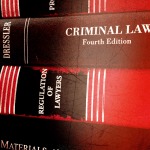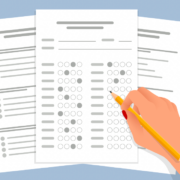Which Law School Classes Should I Take to Prepare for the Michigan Bar Exam?
 Have you been thinking about which classes you want to take your remaining semesters of law school? Do you want your classes to have the added bonus of preparing you for the Michigan bar exam?
Have you been thinking about which classes you want to take your remaining semesters of law school? Do you want your classes to have the added bonus of preparing you for the Michigan bar exam?
If you are taking the Michigan Bar Exam and you want your classes to double as a good source of bar exam preparation, you might wonder which classes are worth your time and which classes are not. We will explain which classes will be the most helpful to you – and why – in this blog post.
But before we do that, let’s talk about a few basics of the Michigan Bar Exam (if you want a more detailed outline, see this post). The Michigan bar exam is composed of a “Multistate” day and an Essay day. The Multistate day consists of 200 multiple choice questions and, as of February 2015, tests 7 subjects (Constitutional Law, Real Property, Evidence, Criminal Law and Procedure, Contracts and Sales, Civil Procedure, and Torts). The Multistate portion of the bar exam is written by the National Conference of Bar Examiners. It is the same in every state and it tests the majority law (rather than any specific state’s law).
The essay portion of the Michigan bar exam contains 15 essays chosen from 24 subjects. It is written by the Michigan Board of Law Examiners and focuses primarily on state law. Here is the list of subjects that are tested on the essay portion of the Michigan Bar Exam according to the Michigan Board of Law Examiner’s website:
(a) Real and Personal Property
(b) Wills and Trusts
(c) Contracts
(d) Constitutional Law
(e) Criminal Law and Procedure
(f) Corporations, Partnerships, and Agency
(g) Evidence
(h) Creditor’s Rights, including mortgages, garnishments, and attachments
(i) Practice and Procedure, trial and appellate, state and federal
(j) Equity
(k) Torts (including no-fault)
(l) The sales, negotiable instruments, and secured transactions articles of the Uniform Commercial Code
(m) Michigan Rules of Professional Conduct
(n) Domestic Relations
(o) Conflicts of Laws
(p) Worker’s Compensation
That is a lot of subjects. And most people do not take close to all of these classes in law school (nor do they need to). So, if you only have a few semesters of classes left, which ones should you take? Below are my recommendations.
Tier One: The Best Classes to Prepare for the Michigan Bar Exam:
Make sure to take classes that cover all of the Multistate subjects. Most of these are covered in your 1L classes – with the exceptions of (depending on your school): Evidence, Criminal Procedure, and Constitutional Law. Thus, make these seven subjects your top priority:
- Real Property
- Evidence
- Criminal Law and Criminal Procedure
- Constitutional Law
- Contracts and Sales
- Torts
- Civil Procedure
If your law school offers a “Constitutional Law II” or “Advanced Sales” class, it is worth it to take those classes as well. All of these topics are not only worth approximately 1/7 of your score on the Multistate portion of the bar exam, but they are also all routinely tested on the essay portion of the Michigan Bar Exam. Thus, they “double-prepare” you by helping with both portions of the bar exam.
Tier Two: Classes that I Recommend you Take If Possible:
What next? These classes are also well worth your time. I call them “Tier Two.” They are all heavily tested on the essay portion of the Michigan bar exam (with the exception of Secured Transactions – which I’d put in Tier 2.5) – but they are not tested on the Multistate portion of the bar exam.
- Workers’ Compensation. This is tested virtually every Michigan bar exam and the nationalized bar review courses (Barbri and Kaplan) do a terrible job covering the subject.
- Corporations. This subject is tested basically every bar exam. It is not super-intuitive to those who do not have a background in business so it can help to have a semester of it before preparing for the bar exam.
- Wills and Trusts. Wills or Trusts is tested virtually every bar exam and students that have a background in the area generally feel more confident going into the bar exam. I have seen many students who do not take this class struggle with the topics on the bar exam. If your law school offers a “Wills, Trusts, and Estates” class by a good professor, I’d recommend it.
- Domestic Relations. This class is not a “must” because the Michigan bar exam is pretty straightforward and tends to repeat issues. However, it is tested pretty much every bar exam.
- Professional Responsibility. This subject is tested on the essay portion of the Michigan bar exam virtually every exam. It also helps you pass the MPRE.
- Tier 2.5: Secured Transactions. This one is NOT super-heavily tested on the Michigan bar exam. However, it has been tested more frequently in the recent past and for now, it does not look like it is going away. Students who take this class in law school are always grateful that they did. It is a difficult topic and it is hard to learn from a 4-hour Barbri lecture.
Tier Three: Classes you can Safely Stay Away From:
- Conflicts. None of my students have ever said, “Man, I’m so glad I took a Conflicts class in law school!” Why not? This subject is simply not heavily tested on the Michigan bar exam (The last time it was tested was July 2008 and the time before that it was tested in July 2004). When it is tested, the same kinds of issues are brought up. An entire class will not help you much.
- Bankruptcy. I took this one in preparation for the bar exam but Bankruptcy and all topics related (garnishments, attachments, etc.) are not heavily tested. The topics that are more heavily tested on the Michigan bar exam will be covered in your Real Property class or other classes. If you are interested in Bankruptcy law, fine, take the class. But don’t take it for the sole reason that it will help you on the bar exam.
- Negotiable Instruments. This is very rarely tested. Furthermore, the National Conference of Bar Examiners recently announced it was going to take it off the list of subjects on the multistate essay exam. It is still fair game in Michigan but I think after that announcement it is even less likely to be tested in the state.
- No-Fault. This subject is tested on occasion – but not frequently. It was tested most recently on the July 2014 bar exam and before then on the February 2011 bar exam. It is never on my list of “Must Take” classes. However, I think that with No Fault reform constantly being talked about, it may start to get tested more, and I may have to move it up another tier in the future. For now, it is not a class I highly recommend.
- Agency and Partnerships. These topics are rarely tested on the Michigan bar exam. Agency was last tested in July 2006 (and before that, July 2001). Partnerships was last tested in July 2007 (and before that, February 2002).
- Equity. This subject is hardly every tested by itself. It is pretty easy to learn. And generally when it is tested, it is something that you have covered in a different subject (such as Contracts or Civil Procedure) anyway. It is not worth it to take an entire class on “Equity.”
Pursuing Law School? We’ve Got You Covered!
🌟 Special Offer: Enroll in our FREE on-demand law school prep course, meticulously crafted by a top-ranked law student. Secure your spot now






Comments are closed.